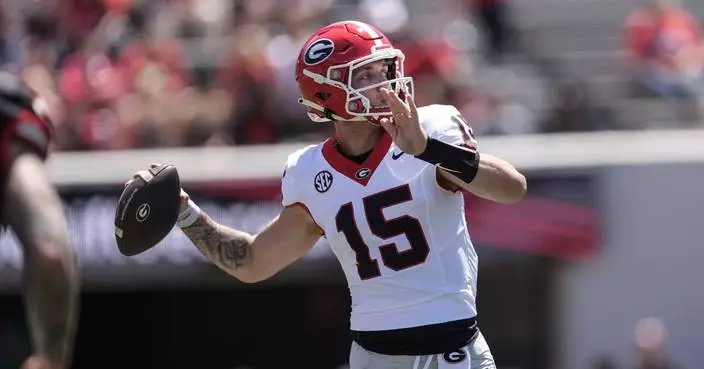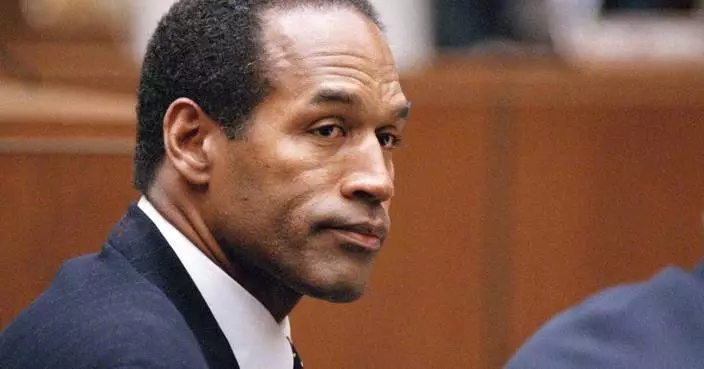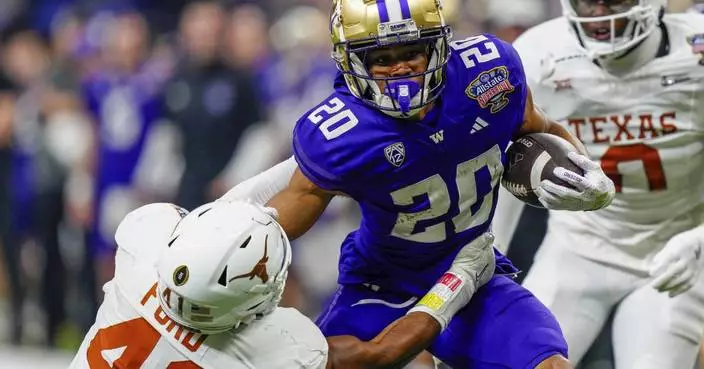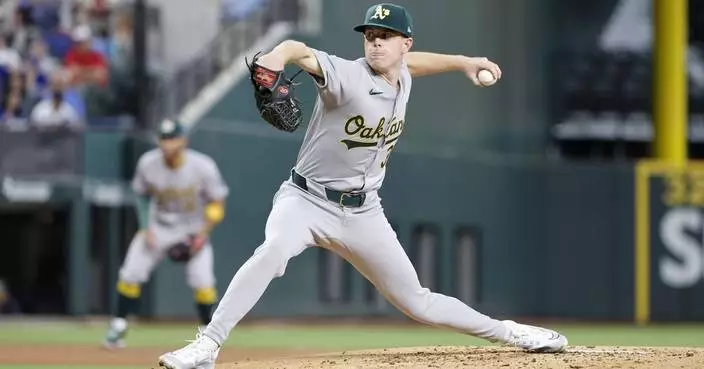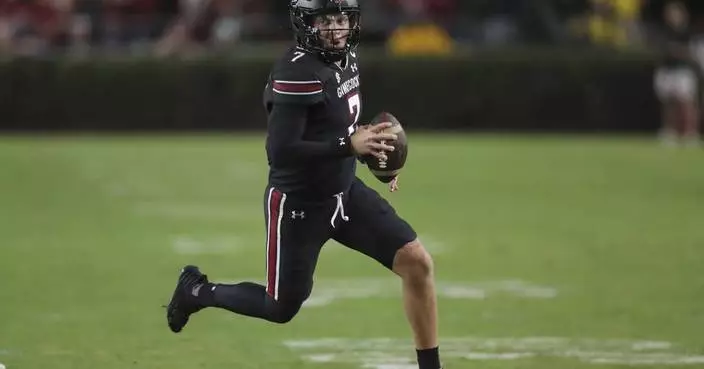“No, no, that’s not me. I’m Martin from Wakefield.”
Lifelong Manchester City fan Martin Warhurst saw the lighter side as a case of mistaken identity led to him being touted as the next Huddersfield boss on live television.
Warhurst – chief executive of Martin House, a charity that provides hospice care for children and young people across West, North and East Yorkshire – was attending the John Smith’s Stadium for the first time in his life to watch City take on the Terriers.
Sat in the directors’ box, he was alerted to Sky Sports beaming his face around the country, suggesting he might be Borussia Dortmund reserve team coach Jan Siewert, who has been heavily linked with the vacant Huddersfield manager’s job.
Warhurst told Press Association Sport: “It was bizarre. Basically what happened is I was sat in the crowd and suddenly I was aware of a guy coming towards me from the right hand side
“He said, ‘Are you Jan, the new manager?’ I laughed and said, ‘No, no, that’s not me. I’m Martin from Wakefield’.
“It was absolutely bizarre. I thought the guy who came over to me asking if I was Jan was going to say something like, ‘Excuse me, sir, but you’re sat in the wrong seat’. I had to double take when he asked me if I was Jan.
“That was all I heard of it and then suddenly everybody’s phones and my phone started going crazy, saying, ‘I’ve just seen you on telly’.
“There was lots of reaction from people in the crowd – just people coming up and having selfies and people patting me on the back and wishing me luck.
“I was on my way back up to the table where we were being hosted and a father and son stopped me and the dad said, ‘This is the new manager’.”
Warhurst can see his likeness to Siewert, who succeeded Norwich boss Daniel Farke in charge of Dortmund’s second string, a post held before that by recently-departed Town boss David Wagner.
He added: “I was quite happy. It’s all in good jest. It’s funny to be mistaken in that way and certainly not what I expected when I came to watch a football match.
“A couple of the girls next to me had pulled up pictures online to search what he looked like and they did a split screen thing. There is a bit of a resemblance so I can sort of understand where they’re coming from – obviously I’m a much more attractive guy, though!
“I will be following him more closely from now on – my doppelganger. I had no idea about him, I didn’t know who the club had been linked with.
“I obviously knew that they’d parted company with Wagner and I was coming today thinking I’m sure the crowd will have their theories and there might be some chat going on the table where I’m sat. But little did I know that I’d become the chat.”
If Siewert does succeed Wagner then he has a monumental challenge ahead, with Huddersfield rock-bottom of the Premier League and 10 points adrift of safety following Sunday’s 3-0 defeat to Manchester City.
Warhurst says his “love affair with Manchester City goes back to when I was a little boy” and he had a unique take on how he would stop the reigning top-flight champions.
He added: “My tip, if I were the Huddersfield manager playing against a team like Manchester City, I think if they played a formation of 5-5-5, they might actually stand a chance!
“But I think they played well today and I was quite impressed with what I saw.”
In a Michigan basement decked out in maize and blue, a father sat with his son.
They’d bond over a football video game. One with a story mode that would transport the 7-year-old into a college dorm room, where letters from fans filled his mailbox, the campus newspaper teased a championship and a list of Heisman candidates adorned his computer screen. If he played well enough, his name might even appear there.
It wasn’t real. But who was to say it couldn’t be?
“You know, we’d always joke, because he was a big kid, that ‘Hey, maybe you’re going to be on there someday,’” says the father, Bill Swartout.
Today, more than a decade later, that 7-year-old — Brayden Swartout — is an offensive lineman at Central Michigan, living the story mode in real life.
Countless versions of that game, not made in over a decade, collect dust in basements alongside phased-out gaming systems. It’s the inevitable fate of old discs, gaming cartridges, RCA connector wires and the like. Give it all a good blow, though, and the dust clears to reveal an enduring cultural phenomenon that, in this modern world, is on its way back.
For a generation of youth, EA Sports' college football games fueled their aspirations in the sport. From the early versions in the 1990s to the immersive experiences in the 2000s that revolutionized create-a-player modes, the games became a must-have for sports and video-game fans.
As they grew more popular, however, something else grew, too: the chorus of voices that said college athletes depicted in the game should be getting paid. It was a notion that seemed preposterous in the student-athlete era. But as opinions morphed, it started to make sense.
Before 2021, college athletes were not allowed by the NCAA to profit from their brand, commonly known as their name, image and likeness — or NIL.
The video-game developer tried for years to differentiate in-game rosters from real-life players. “Quarterback No. 10” remembers this clearly.
“I remember when I was in the game. Obviously in high school and all that you want to be in the game, but then when you get to college you’re in the game, and I’m No. 10 from Baylor, before NIL, and I am No. 10,” Robert Griffin III, one of the game’s 2013 cover athletes and the 2011 Heisman winner, told The Associated Press.
“And that’s my name, ‘Quarterback No. 10 from Baylor,'" he says. “But, I’m like, white with a buzz cut fade and no arm sleeve on my arm and I’m from Tuscaloosa, Alabama. They completely tried to change the character just so they don’t have to pay the guy. Or say, ‘Oh no, that’s not his name, image and likeness, he’s not even the right color.’ But everybody knew who No. 10 from Baylor was.”
Eventually, EA Sports gave up. And so the franchise sat after its last version in 2013, dormant for 11 years.
Society has changed a lot since the 2010s. So has Swartout's basement, now decked out in maroon and gold.
Gamers’ voracious appetites for immersive sports video games have not changed as much. And with the NCAA's decision to allow college athletes to profit from their brand, the time had come.
EA Sports in 2021 announced it would be reviving the franchise. Three years later, the game is scheduled to be released this summer with a full reveal promised in May. Details have been few so far, but players’ names and likeness will be real.
“I personally believe that NCAA football is the greatest game ever made,” Griffin says. “A lot of kids growing up with the game wanted to be able to see themselves grow and develop into those players they were creating.”
EA Sports has offered Football Bowl Subdivision players a minimum of $600 and a copy of EA Sports College Football 25 to be featured in the game. More than 10,000 players have accepted.
The game will seek to differentiate itself from other offerings in the market — sports franchises that have had the advantage of time to evolve. There's a difference, though: None of those have tackled college football.
“Video games, as popular as they were, they’ve just evolved so much based on how society has evolved and having so many different modes and options,” says Nicolette Aduama, the senior associate director at Northeastern University’s Center for the Study of Sport in Society.
EA’s 2006 college football game was monumental in the sports video game realm. It was the first to completely immerse gamers into an athlete’s life. It had a killer soundtrack. Perhaps its only story mode rival in the early 2000s was NBA Ballers.
It also was problematic, including a feature that — like much entertainment from even recent years past — does not stand the test of time well. In the create-a-player’s dorm room, hanging from the corner of the computer screen, was a wallet-sized picture depicting a woman. As the player performed better on the field, the depiction shuffled through presets. The woman’s body type sometimes became thinner; her bust, hair color and smile changed.
“I remember seeing that like when I was a kid and even then I was like, `Why does the girlfriend get more attractive if you win more games?'” says Eli Mouser, 21, of Russellville, Alabama. “I was like, that doesn’t make any sense.”
EA Sports jettisoned this feature in later editions. It added another that had gamers pick a major and keep their GPA up to compete on the field. The developer has made strides in its equity through other games, such as its professional soccer franchise that now includes female players and its newest golf game, which asks gamers for their pronouns when they create players.
“Girls are gamers, too,” Aduama says. “We see it in movies and on TV shows now where people are breaking those stereotypes and we talk about that in our trainings all of the time. It’s about exposure."
EA Sports says it is offering female athletes opportunities to be involved with the game through its ambassador program, which pays athletes to promote it.
“I know one game right now that would certainly blow it out the water, it would be women’s college basketball,” Griffin says. “Caitlin Clark on the cover. You got all the girls over there with Angel Reese at LSU. Like, that game would mop the floor.”
Given the game's aspirational features, it's easy to wonder: When the new version comes out, what preteens will play it, find inspiration and end up on a college football field a decade from now? What dreams of 2024 — embedded in what will surely be the most immersive iteration of the game ever — will fuel paths to athletic success and deliver tomorrow's aspirations in hi-res?
For Mouser, growing up in Alabama as a Tennessee fan was tough. EA Sports’ college football games gave him a space to let out some of that orange in a sea of red. Like Bill and Brayden Swartout, the game also gave him a chance to bond with his father.
“I bother my friends all the time,” he says, calling the virtual world his “Roman Empire.” “They’re like, ‘Dude, you’re not a real football coach.’ And I’m like, ‘This is important to me, all right?’”
AP college football: https://apnews.com/hub/ap-top-25-college-football-poll and https://apnews.com/hub/college-football
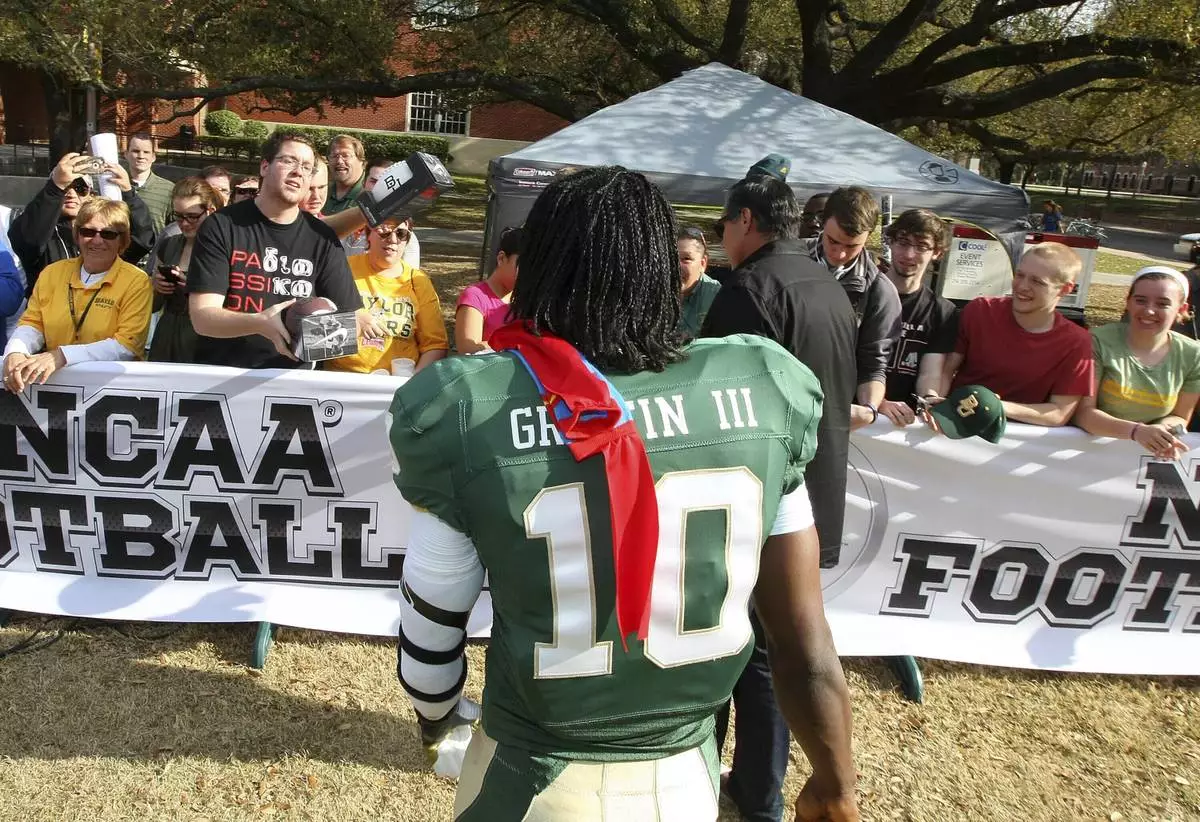
Heisman Trophy winner and former quarterback Robert Griffin III walks over to fans with a pair of Superman socks given to him by a fan on the Baylor University campus, Monday, Feb. 27, 2012 where he was at a photo session for the EA Sports NCAA Football 13 video game to be released in July. Video-game developer EA Sports is breaking back into the college football world 11 years after lawsuits over using players’ likeness without compensation froze the franchise. (Jerry Larson/Waco Tribune-Herald via AP)
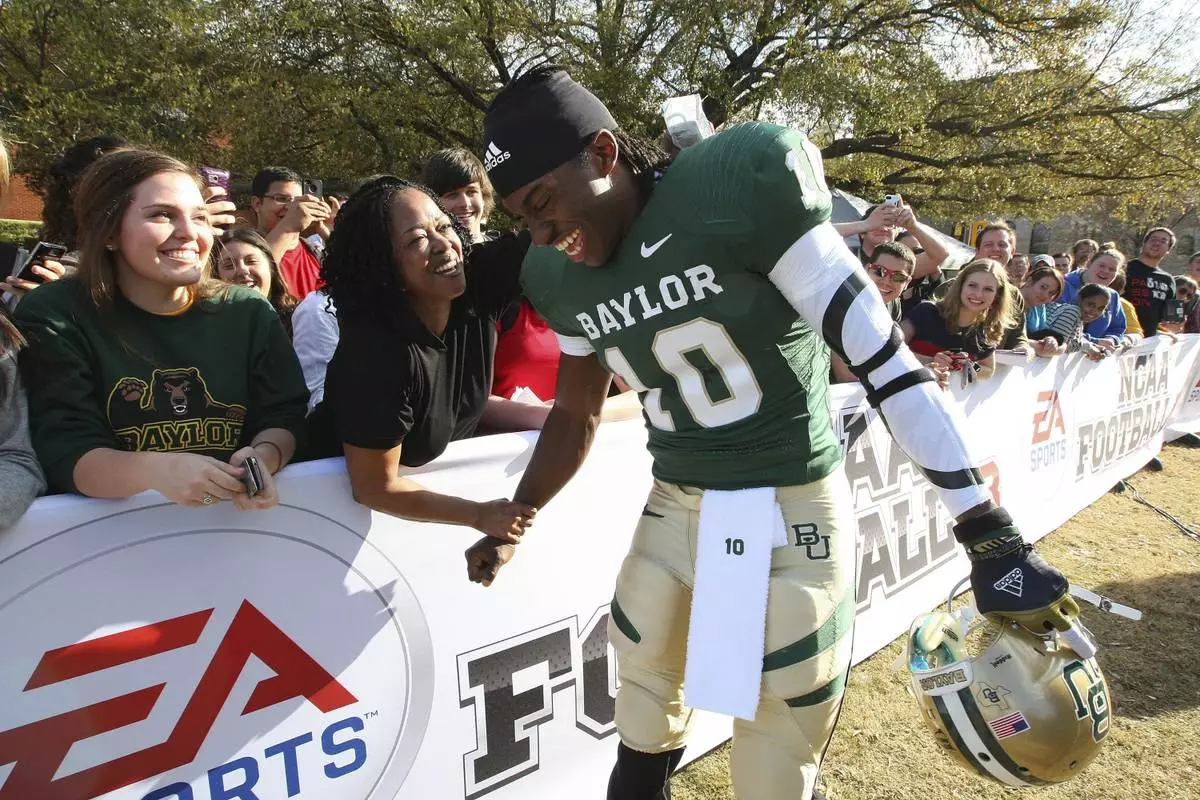
Heisman Trophy-winner and former Baylor quarterback Robert Griffin III is greeted by Holly Johnson on the Baylor campus, Monday, Feb. 27, 2012, in Waco, Texas, where he posed for photos for EA Sports NCAA Football 13 video game to be released in July. Video-game developer EA Sports is breaking back into the college football world 11 years after lawsuits over using players’ likeness without compensation froze the franchise. (Jerry Larson/Waco Tribune-Herald via AP)





